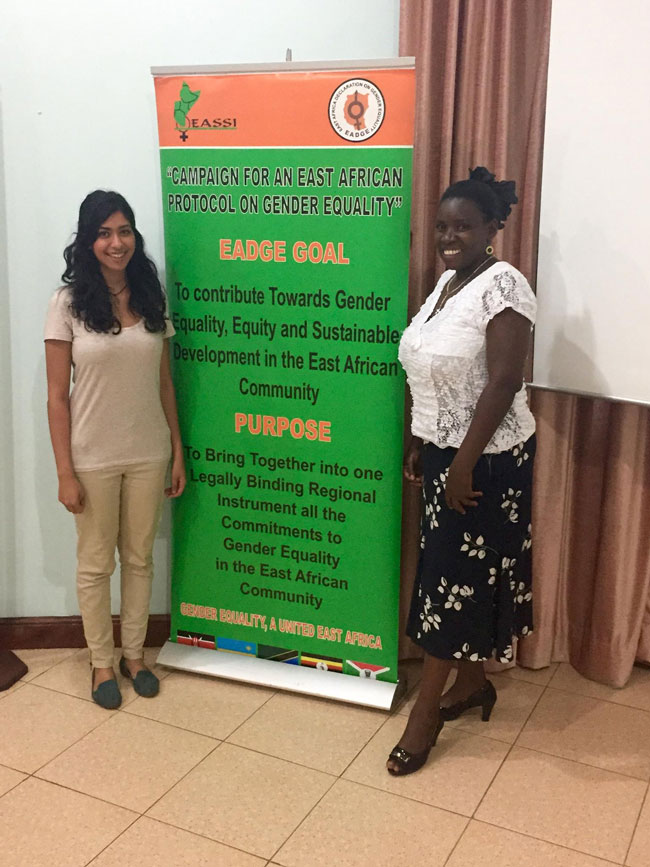
This past summer, over 200 Faculty of Arts students interned in Canada and around the globe, from Chennai to Cape Town, and from Paris to Panama City. Since 2002, the Faculty of Arts Internship Program has helped undergraduate students offset internship-related costs such as travel, accommodations, visas and other expenses thanks to the generous support of alumni and friends of the McGill.
On Thursday, Sept. 17, the most recent recipients of the Arts Internships will share the highlights and challenges of their internship experiences this summer, what they learned and how they plan to apply it to their field of study.
This is the story of one such student, Tasha Kara, and her internship in Kampala, Uganda.
Q: Name and program of study
A: Tasha Kara, Joint Honours program, double majoring in International Development Studies and Women’s Studies (entering third year).
What was your summer internship?
‘Gender and ICT policy’ internship at Women of Uganda Network (WOUGNET) in Kamapala, Uganda.
What is WOUGNET’s mandate?
WOUGNET is a non-governmental organization founded by a former Ugandan McGill student, committed to developing a use for information and communication technologies (ICTs) among women as tools to address political, economic, and health issues collectively.
WOUGNET operates in four main program areas including the following: Information Sharing and Networking; Technical Support; Gender & ICT Policy Advocacy; and Institutional Development. WOUGNET’s overall goal is for women to be able to strategically and innovativly use ICTs for sustainable and national development
What motivated you to apply for this internship?
From a very young age, I had the privilege of being surrounded by my grandmother and her seven sisters – seven powerful women whom have had to deal with incredibly difficult circumstances in their lifetimes. All of these women, including my mother – along with many other South Asian families at the time – were victims of the 1972 ethnic cleanse of Uganda, forcefully administered by Idi Amin.
Within a dangerous Indophobic climate, where slurs and threats of violence were constantly thrown at the Indian minority, they abandoned their businesses, homes and families – all within 90 days – and sought refuge in Canada.
It is out of this context that I cultivated an interest in pursuing a Joint Honours in International Development Studies and Women’s Studies; I want to explore the intersections and processes that shaped the complication migration history of the women in my family and the inequalities that produced it. My motivation for the ‘Gender and ICT policy’ internship at WOUGNET in Kamapala, Uganda is intimately linked to this.
What were your duties during your internship?
As WOUGNET’s Gender and ICT Policy Intern, my responsibilities included reviewing and editing policy documents on gender and ICT policies, attending cyber security workshops, disseminating information on all of WOUGNET’s social media platforms, documenting experiences of Northern Ugandan women who used ICTs for development and lastly, making monthly activity reports. During my internship, I was fortunate to attend the East African Gender Equality Bill. During this conference, I was able to directly participate in legislation along with women representatives from Burundi, Rwanda, Tanzania, Kenya and Uganda – certainly a rewarding experience.
What did you get out of the experience?
The WOUGNET internship has positively shaped my future academic and non-academic career. I gained practical experience within my chosen field of study, broadened my intellectual understanding of the location and its relation to other countries, and expanded my knowledge to multiple perspectives. It also contributed to the understanding of my own family history and personal identity.
I had been previously exposed to Ugandan and East African culture my entire life; whether through my grandmother’s cooking of traditional East African cuisine like mogo (cassava) or through watching my mother wear kitenges (dress) around the house. Being able to travel to Kampala – for the first time – gave me the chance to reconnect with my culture, while simultaneously conducting research that was both valuable and fundamental to my degree.
The internship experience was invaluable in more ways than one and would not have been possible without the generous funding from Elizabeth Gomery, Stefan Fews, and the Arts Internship Awards. I would like to express my deepest gratitude to Ms. Gomery and Mr. Fews for their contribution.
The Arts Internship Office needs people’s support to ensure the survival of the Arts Internship Program. If you’d like to help, see their Seeds of Change page.
Related stories
Student calls Cape Town internship “life changing”
Econ student combines interest in philanthropy and law during Kenyan internship
Putting a roof over people’s heads
